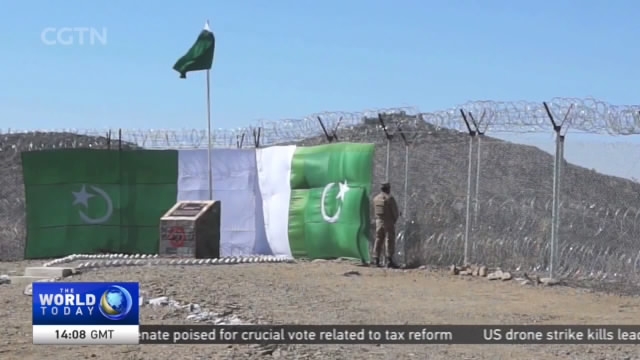
22:46, 19-Oct-2017
Pakistan-Afghanistan Border Fence: 2,300 km fence expected to cost 500 million USD

Pakistan has started building a 2,300-kilometer fence along its border with Afghanistan. The half-a-billion-US-dollar barrier is designed to help prevent attacks by militants. Our correspondent Danial Khan filed this report from the northwestern part of Pakistan.
DANIAL KHAN WAZIRISTAN, PAKISTAN "Before the border management was put in place, there was a free unchecked and unregulated movement of people all along the 2300 kilometers long Pak-Afghan border, but since the initiation of border fencing there has been a significant decline in the movement as well as a drop of terrorist attacks inside Pakistan. At the moment I'm in north Waziristan where 43 kilometers of border has been secured."
Pakistan shares a 2300 kilometers border with Afghanistan, also known as the Durand line. After the independence of Pakistan from British rule in 1947, the border between Pakistan and Afghanistan was not secured and cross border movement of people remained regular. But since 9/11 attacks in the US, and the start of war on terror, the tribal areas along the Pak-Afghan border became home to terrorists. They would carry out attacks on both sides and find sanctuaries along these areas. Only recently Pakistan began fencing the border, to check the movement.
MAJ. GEN. NAUMAN ZAKARIA COMMANDER, SOUTH WAZIRISTAN REGION "Most of the area which is crossable, which is more critical, sensitive from our point of view, from Afghan's point of view, where the control lacks, from their side, is going to be completely fenced."
Apart from fencing, surveillance technology is also being installed along the border to prevent attacks. Forts and watch towers are being built.
DANIAL KHAN WAZIRISTAN, PAKISTAN "750 forts have been planned all along the oak-afghan border, with an inter-fort distance of 1.5 to 3 kilometers. 95 fort have already been built and 82 are still under construction to check the frequented and unfrequented routes all along the border."
United States President Donald Trump has recently accused Pakistan of harboring terrorists. But experts say that Pakistan has done its part.
ARCHED SHARIF SECURITY ANALYST "Almost 50 countries have been part of coalition forces in Afghanistan, you name an intelligence agency that has not been there, and what is the situation in Afghanistan, almost 40 percent of the country is under the control of Afghan Taliban. There are failures, they have been blaming Pakistan and now with the fencing that excuse has also gone, now they will have to find something else to cry about, vis a vis Pakistan and the measures that Pakistan is taking."
According to the Pakistan army, in the first phase, high infiltration prone border areas in Bajaur, Mohmand and Khyber agencies are being fenced and in the second phase, fencing of the remaining border areas, including Balochistan, will be executed.
Experts believe, with the China Pakistan economic corridor coming up, there is a greater need for peace in the region, for economic activity to go ahead unhindered and securing volatile borders will support the element of peace which is required for the One Belt One Road initiative. Danial Khan CGTN Waziristan, north west Pakistan.

SITEMAP
Copyright © 2018 CGTN. Beijing ICP prepared NO.16065310-3
Copyright © 2018 CGTN. Beijing ICP prepared NO.16065310-3